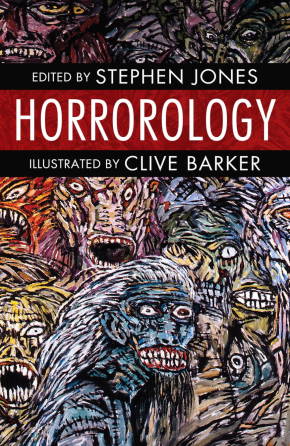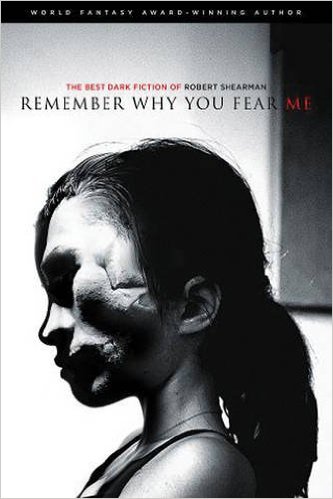 Remember back last year when I ran a series of interviews with the contributors to the latest Stephen Jones-Jo Fletcher Books Item of Magnificence, Horrorology: The Lexicon of Fear?
Remember back last year when I ran a series of interviews with the contributors to the latest Stephen Jones-Jo Fletcher Books Item of Magnificence, Horrorology: The Lexicon of Fear?
Of course you do. You pay attention and that’s one of the things I like most about you.
Well, belatedly but no less delightfully, here is the Rob Shearman interview. Why is it late? I hear you ask. Because Rob knows how to make an entrance! He waits until you’re all lulled into a false sense of security, then very politely steps on stage and says “Oh, hello.”
Ladies and Gentlemen, Mr Robert Shearman!
What was the inspiration for my tale, ‘Accursed’?
I suppose I’m rather bothered by the way some of us get born with a natural talent for something, and the unfairness of that – the worry that the talent is just a genetic anomaly and has really nothing to do with me! A lot of writers feel the same way, I think – we worry that since we did nothing to deserve it, the talent might fade away. I’m just lucky that I have some sort of ability to put down words on a piece of paper in a certain order that works – just as others have the ability to draw, or play music, or play sports. In a way, having a talent is a curse, because it means you only have the potential to be good – the talent only takes you a little of the way, the rest of it is down to hard graft and regular practice. You feel this responsibility not to let the talent go to waste, and you still know you’re squandering it somehow – you’re never as good as you ought to be.
I was playing around with this idea, of how finding out you have a special gift is rather like a curse – and I thought what would be truly funny would be if the gift you were born with were not only essentially useless, but bloodcurdlingly unpleasant. I’ve never liked clowns. No one really likes clowns, do they? I thought it would be a sensationally awkward gift to be born with, to find out what whenever you went to a circus, a clown would always die during their act. There wouldn’t be much value to having such a talent, and the more it was practised, the gorier the talent would be – but still, in a strange way, it’d be your talent, it’d define you, and it’d be something you could be secretly proud of. Curse or gift? Aren’t they two sides of the same coin? And so my weird tale began!
Can you remember the first story you read that made you think, ‘I want to write!’ 
Oddly enough, it wasn’t so much a specific story, as a specific environment. My father owned a lot of books – enough that he built his own library as an extension to the house. And as an infant a treat for me would be to go in there, and look at all those books, and wish I could add to their number. I didn’t really care what those books would be about – so long as they had my name on the spine. When I was five years old I used to take down encyclopaedias and copy out entries (about anything, really anything, it was almost random), fold over the page so that it was a little like a book, and write a name and title on the cover. I was a plagiarist back then. And because for work my father collected foreign language dictionaries, I’d then translate those so-called books I’d pretended to write into French, Dutch, Swedish, Finnish – anything I could lay my hands on. (Of course, I had no idea about conjugations and declensions or that sort of thing – I wasn’t translating anything for real, just looking up all the words and replacing them with a foreign equivalent – but it meant I could turn the very same book into multiple editions! And it gave me an interest that stood me in good stead when I did become a translator, for a little and wholly unsuccessful while, in my late teens.)
It took me years to realise the greater pleasure with my father’s books would have been to try reading the things. Who knew?
Is horror a sort of natural home for you or do you lean more towards another part of speculative fiction?
I think I can’t stop myself tipping towards horror. I’ve just got that sort of imagination. For years I thought I was really a comedy writer – it was my bread and butter for such a long time, I wrote a couple of dozen comic plays for the theatre and the radio before I even thought to write horror prose – but when I read them back, I realise the jokes I tell are so black, and the situations so strange and absurd, that it’s really horror by another name. Comedy and horror are so close to each other anyway – in both, the writer is trying to shock the audience into giving an audible response. And my sense of humour has always been of the grisly kind – it just leaks into everything.
You’ve offered the chance to visit the Library of the Damned. Do you accept?
There’ll be books there, yes? Lots and lots of books? How could I ever refuse? I have a weird relationship with horror, inasmuch as that although I enjoy writing it, I’m very easily frightened by it. Not the horrors of my own imagination, which is easy and funny and safe in my head, but the horrors of other people’s. I can only watch horror movies at home, because I’m too afraid to see them in public – I know I’ll put my hand in front of my eyes and squeak, and that never looks good. But horror in book form is another matter – I go to them wanting to be unnerved, wanting to feel my imagination is being twisted and expanded. That’s the great joy of good horror, the way it seems to refresh the entire world. Library of the Damned? I’d never want to leave!
 The future of horror is…
The future of horror is…
We live in a world now where we’re almost numbed to the idea of global catastrophe, where you can turn on the computer and catch videos of atrocities. I love vampires and werewolves and ghosts, but partly because they now seem so likeable and so quaint – there’s a wonderful and terribly moving nostalgia to them. I think horror’s future is more an acknowledgement that we are barraged by insanity on all sides – that there is a growing dissonance between the way we expect people to behave and the way they really do. In all horror, old or new, there’s nothing I find as unnerving as the realisation that life has just gone a little askew and nothing can make sense any longer. I think we’re living in the world of the uncanny, and all we writers can do is try to keep up.
Rob’s hobbies include collecting World Fantasy Awards, Sony Awards, Shirley Jackson Awards, British Fantasy Awards, as well as multiple shortlistings. He deserves them all. He is the author of the collections Tiny Deaths, Love Songs for the Shy and Cynical, Everyone’s Just So So Special, Remember Why You Fear Me, and They Do The Same Things Different Here. He’s written for stage, radio and TV (yes, including Doctor Who) to much acclaim.
The Times Literary Supplement called him (or his work, at least): “Wildly inventive and chilling. Shearman proves himself a master at transforming our deepest fears into new and wholly unexpected forms.” Mark Gatiss called him “an addictive delight.” I just like to call him “Rob” because he answers to that.

